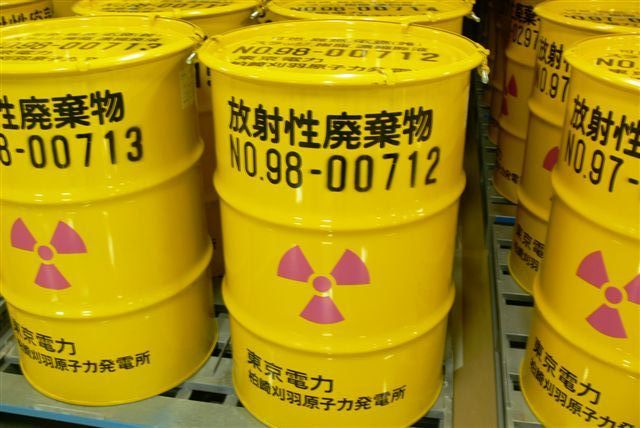原子力発電所のことを「トイレの無いマンション」と言う人がいますが、私はあまり適切な表現ではないと思います。
仮に建設会社がトイレの無いマンションを作ってしまった場合、住むことが出来ないので全く売れないでしょう。そうなって困るのは営利会社だけです。
原子力発電所を稼働させることで生まれる放射性廃棄物は10万年位先まで人類が面倒を見なければなりません。しかし、天文学的な費用がかかる上に、危険で厄介な代物です。原発の社会的害悪の程度は「トイレの無いマンション」の比ではありません。放射性廃棄物などには誰も近づきたくないので、受け入れてくれる自治体もありません。下記は関連ブログ記事です。
原発マネーに目が眩んで受け入れてくれる自治体が将来仮に現れたとしても、10万年も安全に保管し続ける技術・実績がありません。世界中で起こる地震の約2割は日本で発生しているので、安全で安定した場所は無いでしょう。放射性物質の漏出による環境汚染が起こることは確実だと思います。
原発稼働により発生した大量の放射性廃棄物は、主に原発敷地内に貯蔵されていますが、保管スペースの容量には限界があります。後先考えずに再稼働している場合ではありません。原子力村(政治家・官僚・メーカー、電力会社、御用学者、御用マスコミなど)の人たちには責任がありますので、今まで生み出した放射性廃棄物の処理に知恵を絞ってもらわねばなりません。
スポンサーリンク
The Japan Timesが2015年2月22日付の社説で関連内容を論じています。
「Nuclear waste disposal problem」(放射性廃棄物処分問題)
上記リンクの英文記事から一部を引用します。( )内は私の日本語訳です。参考にしてください。
「Even as the Abe administration pushes for reactivating idled nuclear power reactors after they have cleared the Nuclear Regulation Authority’s safety screening, an open question remains: How will Japan dispose of highly radioactive waste produced by the nuclear reactors.」
(停止中の原発が原子力規制委員会の安全審査に合格した後、安倍政権は再稼働に躍起だが、次の疑問は残ったままだ。原発から出た高レベル放射性廃棄物をどのように処分すればいいのだろうか?)
「Due to the lack of an established scheme for final disposal of the waste that would be generated after spent fuel is reprocessed, Japan’s nuclear power generation has long been likened to a condominium without a toilet.」
(使用済み核燃料を再処理した後に生じる廃棄物の最終処分方法は確立されていない。その為、日本の原発は長らくトイレの無いマンションと言われてきた。)
「The absence of a solution was highlighted two years ago when former Prime Minister Junichiro Koizumi vocally expressed opposition to restarting nuclear power reactors that had been idled in the wake of the 2011 meltdowns at Tokyo Electric Power Co.’s Fukushima No. 1 nuclear power plant.」
(2011年に東京電力福島第一原発がメルトダウンを起こした後、停止中の原発を再稼働することに対して小泉純一郎元総理が声高に反対を表明したのが2年前である。その時、放射性廃棄物の処分方法が無いことが関心を集めた。)
「The government in 2000 adopted a policy of disposing of highly radioactive waste by burying it deep underground. A power industry organization has solicited municipalities across the country that would be ready to host the final disposal site.」
(高レベル放射性廃棄物は地中深くに埋めて処分するという方針を2000年に政府が決めた。電力会社は、全国の自治体を対象に最終処分場候補地の公募を行った。)
「A financially strapped town in Kochi Prefecture came forward in 2007 to apply for a documentary review in the selection process. But the bid was eventually withdrawn when its mayor faced strong opposition from local residents. He was forced out of office in a subsequent election. No progress has since been made on the issue.」
(財政的に行き詰っていた高知県の町が2007年、選定のための文献調査に応募した。しかし、地元住民が強く反対した為、最終的に市長は応募を取り下げた。市長はその後行われた選挙で落選した。最終処分場問題に関してはその後、何の進捗もない。)
「Meanwhile, doubts have been raised about the safety and technical viability of vitrifying and burying the radioactive waste — which would need to be managed for tens of thousands of years before its radioactivity declined to levels considered safe — in a country prone to earthquakes and volcanic eruptions.」
(一方で、地震や火山噴火が頻発する日本において、放射性廃棄物をガラス固化体にして地中に埋めるのは安全なのか、また技術的に可能なのか、という疑念が沸き起こった。放射能レベルが安全といえるレベルまで下がるのには何万年も管理し続ける必要がある。)
「Such questions have gone unheeded as Prime Minister Shinzo Abe reversed the previous Democratic Party of Japan-led administration’s policy of phasing out nuclear power and eventually ending it in the 2030s, and opted to push for restarting the idled reactors.」
(安倍晋三総理はこうした疑問を無視した。2030年代には原発をフェードアウトするという前民主党政権の方針と異なり、再稼働に前のめりだ。)
「His administration now says the government will take the lead in selecting the candidate site for underground disposal. Instead of waiting for willing municipalities to come forward, the government says it will specify areas that are suitable for the disposal site on scientific grounds and request that multiple municipalities accept on-site research.」
(現在、地中廃棄のための候補地選定については政府が音頭を取ると言っている。自治体が応募するのを待つのではなく、科学的根拠を基に処分適地を政府が複数特定し、自治体に対して現地検証作業を受け入れるよう要請する意向だ。)
「But in its policy proposal now being prepared, the Science Council of Japan criticizes the government for being “irresponsible toward future generations” by seeking to restart the reactors without a decision on the waste-disposal site.」
(日本学術会議は現在準備中の政策提言書の中で政府のやり方を批判している。放射性廃棄物処分場を決めずに原発再稼働しようとするのは将来世代に対して無責任、というのが彼らの主張だ。)
「The council says it will be difficult to decide on the waste- disposal site “given that public trust in the government, power companies and scientists has been lost” because of the 2011 Fukushima nuclear disaster.」
(2011年に福島原発事故が起き、政府・電力会社・科学者に対する国民の信頼が失われてしまった為、放射性廃棄物処分地を決めるのは難しいだろう、というのが学術会議の意見だ。)
「With or without reactivating the idled reactors, the radioactive waste-disposal question must be dealt with — given the already mounting stockpiles of spent fuel from past nuclear power generation.」
(停止中の原発を再稼働するしないに関わらず、放射性廃棄物処分問題には対処しなければならない。過去に原発を動かし発生した使用済み核燃料が、いまや山のように積み上がっているのだ。)
「While almost all of the nation’s nuclear power reactors have been shut down since the 2011 Fukushima disaster, roughly 17,000 tons of spent fuel are stored in fuel-cooling pools at power plants across the country and in a storage facility at the reprocessing plant built in Rokkasho, Aomori Prefecture.」
(2011年の福島原発事故以来、国内のほとんど全ての原発はずっと停止されたままだ。その一方で、約17000トンの使用済み核燃料が全国の原発の冷却プール、及び、青森県六ヶ所村再処理工場の貯蔵施設に保管されているのだ。)
以上
